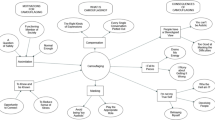Abstract
This article explores how teachers can foster an environment that facilitates social problem solving when toddlers experience conflict, emotional dysregulation, and aggression. This article examines differences in child development and self-regulation outcomes when teachers engage in problem solving for toddlers and problem solving with toddlers. It also reviews teacher practices aimed at preventing problems. The article suggests a paradigm shift from perceiving social challenges as toddler problems to viewing such situations as problem solving opportunities. The article concludes by applying these principles to an actual classroom dispute among toddlers.
Similar content being viewed by others
References
Bronson, M. B. (2000). Self-regulation in early childhood: Nature and nurture. New York: Guilford.
Bruno, H. E. (2011). The neurobiology of emotional intelligence: Using our brain to stay cool under pressure. Young Children, 66(1), 22–27.
Butterfield, P. M. (2002). Child care is rich in routines. Zero to Three, 22(4), 29–32.
Chen, D. W. (2003). Preventing violence by promoting the development of competent conflict resolution skills: Exploring roles and responsibilities. Early Childhood Education Journal, 30(4), 203–208.
Chen, D. W., Fein, G. G., Killen, M., & Tam, H. P. (2001). Peer conflicts of preschool children: Issues, resolution, incidence and age-related patterns. Early Education and Development, 12(4), 523–544.
Copple, C., & Bredekamp, S. (2009). Developmentally appropriate practice in early childhood programs serving children from birth through age 8. Washington, DC: National Association for the Education of Young Children.
Denham, S. A. (2005). Assessing social-emotional development in children from a longitudinal perspective for the National Children’s Study. Columbus, OH: Battelle Memorial Institute. Retrieved from http://www.psychresearchlibrary.com/download.php?id=183.
Denham, S. A., Blair, K. A., DeMulder, E., Levitas, J., Sawyer, K., Auerbach-Major, S., et al. (2003). Preschool emotional competence: Pathway to social competence? Child Development, 74(1), 238–256.
Dickinson, D. K., & Tabors, P. O. (2002). Fostering language and literacy in classrooms and homes. Young Children, 57(2), 10–18.
Dombro, A. L., Jablon, J. R., & Stetson, C. (2011). Powerful interactions: How to connect with children to extend their learning. Young Children, 66(1), 12–20.
Eaton, M. (1997). Positive discipline: Fostering the self-esteem of young children. Young Children, 52(6), 43–46.
Elliott, E., & Gonzalez-Mena, J. (2011). Babies’ self-regulation: Taking a broad perspective. Young Children, 66(1), 28–32.
Gloeckler, L. (2009). A study of teacher practices with toddlers during problem solving opportunities. Dallas, TX: Paper presented at the National Training Institute, Zero to Three.
Gloeckler, L. R., & Cassell, J. (in press). An analysis of teacher practices with toddlers during social conflict and emotional dysregulation. Johnson City, TN: East Tennessee State University.
Gloeckler, L. R., & La Paro, K. M. (2009). A problem solving opportunity. Johnson City, TN: Department of Human Development and Learning, East Tennessee State University. (unpublished manuscript).
Gloeckler, L., & Niemeyer, J. (2010). Social emotional environments: Teacher practices in two toddler classrooms. Early Childhood Research to Practice, 12, 1.
Hart, B., & Risley, T. R. (1999). The social world of children learning to talk. Baltimore, MD: Paul H. Brookes.
Hyson, M. (2004). The emotional development of young children: Building an emotion-centered curriculum (2nd ed.). New York: Teachers College Press.
Isbell, R. T., & Exelby, B. (2001). Early learning environments that work. Beltsville, MD: Gryphon House.
Izard, C., Fine, S., Schultz, D., Mostow, A., Ackerman, B., & Youngstrom, E. (2001). Emotion knowledge as a predictor of social behavior and academic competence in children at risk. Psychological Science, 12(1), 18–23.
Kovach, B. A., & Da Ros, D. A. (1998). Assisting toddlers and caregivers during conflict resolutions: Interactions that promote socialization. Childhood Education, 75(1), 25–30.
Lieberman, A. F. (1993). The emotional life of the toddler. New York: Free Press.
Mahler, M. S., Pine, F., & Bergman, A. (2000). The psychological birth of the human infant: Symbiosis and individuation. New York: Basic Books.
National Scientific Council on the Developing Child. (2004). Young children develop in an environment of relationships. Working paper no. 1. Cambridge, MA: Harvard University Center on the Developing Child. Retrieved from http://www.developingchild.harvard.edu.
National Scientific Council on the Developing Child. (2007). The timing and quality of early experiences combine to shape brain architecture. Working paper no. 5. Cambridge, MA: Harvard University Center on the Developing Child. Retrieved from http://www.developingchild.harvard.edu.
Shonkoff, J. P., Phillips, D., & National Research Council, and Institute of Medicine. (2000). From neurons to neighborhoods: The science of early childhood development. Washington, DC: National Academy Press.
Thompson, R. A. (2009). Doing what doesn’t come naturally: The development of self-regulation. Zero to Three, 30(2), 33–39.
Van der Zande, I., & Santa Cruz Toddler Care Center. (1995). 1, 2, 3… The toddler years: A practical guide for parents and caregivers. Santa Cruz, CA: The Center.
Watson, M. (2003). Attachment theory and challenging behaviors: Reconstructing the nature of relationships. Young Children, 58(4), 12–20.
Author information
Authors and Affiliations
Corresponding author
Rights and permissions
About this article
Cite this article
Gloeckler, L., Cassell, J. Teacher Practices with Toddlers During Social Problem Solving Opportunities. Early Childhood Educ J 40, 251–257 (2012). https://doi.org/10.1007/s10643-011-0495-4
Published:
Issue Date:
DOI: https://doi.org/10.1007/s10643-011-0495-4




